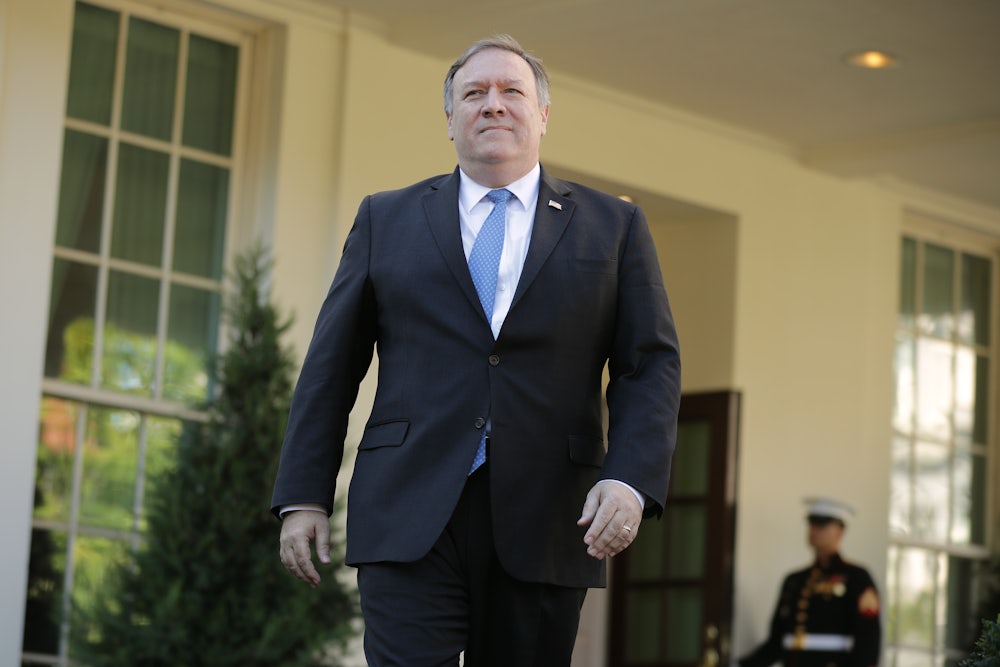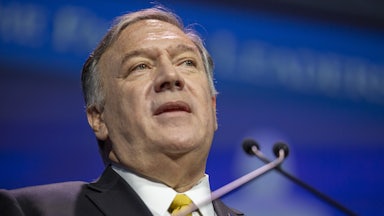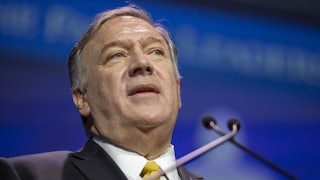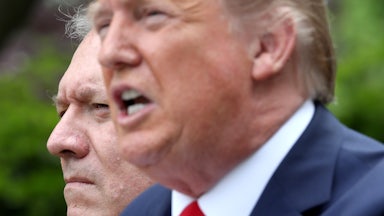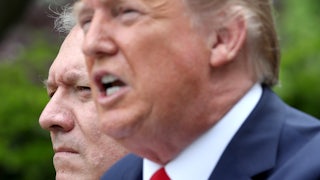Six years ago, Mike Pence made a set of fairly straightforward calculations. Seeing as he was going nowhere fast as Indiana’s governor, accepting Donald Trump’s offer to be his running mate was a low-risk, high-reward proposition: After all, Pence’s main responsibility was to class up the place by appealing to religious conservatives who might have been put off by Trump’s crassness and obvious disinterest in Christianity. (It turns out they were fine with both, but that wasn’t obvious at the time.) If—and at the time it was more like when—Trump lost, Pence would boost his national profile and be well positioned to take the mantle of Trump’s heir. And on the off chance Trump won, he’d be sitting even prettier. Pence would be proximate enough to gain Trumpist credibility, while distant enough to avoid the stink of it all. The prospects of a Pence presidential run in 2020 or 2024 couldn’t be better.
It’s hard to think of a worse bet in recent political history. Mike Pence spent four years slavishly devoted to Donald Trump, and it got him nowhere. Two years ago, Trump’s supporters rampaged through the Capitol looking to lynch him—and Trump thought he had it coming. Embodying what may be the most pathetic version of the sunk-cost fallacy ever, Pence responded with mild criticism of his running mate; Trump has publicly berated and belittled his junior partner. Pence, nevertheless, stubbornly continues to walk the path he set for himself six years ago—trying to be a less chaotic, more religious Trump—and everyone hates him. He will not be president. A Harvard CAPS-Harris poll released earlier this month found him with just 7 percent support; he has not hit double digits in any primary poll released in the last seven months.
But while Pence is the highest-profile politician who lost this particular wager, he is hardly alone. The Trump administration was packed to the gills with cutthroat climbers who thought they could hold on to the president’s coattails and rise through the ranks by being both obsequious and under the radar—which is to say, keep from being called out on Twitter. Nikki Haley, who is also performing badly in early 2024 primary polls, was one such politician. But seizing attention at the moment is former Secretary of State Mike Pompeo, who is currently making his push to join the 2024 conversation using that most useless of all campaign standbys—the political memoir. The good news is that Pompeo is slightly less pathetic than Pence. The bad news is that he has even less of a chance of becoming president.
What Pompeo brings to the table is that he is a Frankenstein’s monster of contemporary Republican politics. A creature bred in a Koch brothers lab—the best-known GOP megadonor-influencers were early investors in Pompeo’s aviation company; the Kansas native has been involved in the brothers’ political orbit for decades—Pompeo has hastily rebranded in the Trump era. Though he was reportedly alarmed by Trump’s efforts to foment a coup in the aftermath of the 2020 election, Pompeo has since largely sidestepped any or all talk of the Capitol riot. He was, as the New Yorker’s Susan Glasser reported in 2019, so slavishly devoted to the president that one ambassador referred to him as a “heat-seeking missile for Trump’s ass.” This has been Pompeo’s calculus for some time: Stay out of Trump’s firing line and advance up the ranks; use the cover to push bog-standard Koch politics.
Much of the coverage that Pompeo’s book has generated is focused on his shameful excusing of the murder of The Washington Post journalist Jamal Khashoggi, who was killed on the order of Saudi Arabia Crown Prince Mohammed bin Salman. “To be clear, Khashoggi was a journalist to the extent that I and many other public figures are journalists,” Pompeo writes in Never Give an Inch: Fighting for the America I Love, a book whose title was surely selected via some kind of random campaign book name generator. “We sometimes get our writing published, but we also do other things. The media made Khashoggi out to be a Saudi Arabian Bob Woodward who was martyred for bravely criticizing the Saudi royal family through his opinion articles in The Washington Post,” he wrote, also calling Khashoggi an “activist who supported the losing team.”
The haughty, know-it-all tone is a hallmark of the classic Pompeo-ism. Here is a man cosplaying as Kissinger, someone whose understanding of the way that the world really works gives him leave to roll his eyes at a brutal regime’s dismemberment of one of its leading critics. And the fact that Khashoggi was a human rights advocate only means he had it coming. Pompeo’s smear is especially absurd because Khashoggi was killed in part as retaliation for his opinion articles in The Washington Post—pieces that, among other things, described and condemned the brutality of Saudi Arabia and its leaders. Such expressions of moral outrage, as far as Pompeo is concerned, are punishable by death.
But Pompeo’s trollish devotion to this topic can also be read as an awkward attempt to translate some of Trump’s appeal on the former secretary of state’s own terms. The former president made his name in politics in part because of his willingness to cast aside typical pieties, such as paying a base measure of respect to the dead. Pompeo maintains good standing in the Beltway’s realist clique without breaking his Trumpian act by being seen as an apologist. He demands to be taken seriously as a tough-minded political force, and has to escape Trump’s shadow—where he remains a mere errand boy for an erratic despot—somehow. Placing the blame for Khashoggi’s death on Khashoggi ticks these boxes. And as a bonus measure, it signals Pompeo’s commitment to continuing Trump’s war on the media.
Perhaps more than any of Trump’s potential 2024 opponents, Pompeo feels entitled to carry the former president’s “tough guy” mantle. He wants to be seen as a fighter, someone willing to take on America’s enemies abroad (Iran) and at home (liberals and the media). But he remains, at heart, something too plain and typical: He’s a Koch-era Manchurian Candidate, a politician trying and failing to hide his true motives, which are to advance the interests of America’s wealthiest elites. Pompeo’s form of populism is pugilistic, but at the end of the day it’s twisted: He defends the big guy’s right to pummel the little guy with impunity.
It’s not clear how Pompeo’s take on the “tough guy” brand will come across on a debate stage with its model, Donald Trump. Pompeo has gently suggested that Trump is a bit of a wimp, essentially (and correctly) calling him a whiner for his incessant talk about the 2020 election. It’s not the worst idea: One thing that none of Trump’s opponents in the 2016 Republican presidential primary succeeded at doing was to strip off Trump’s tough-guy cosplay and puncture his alpha-dog mystique. But Pompeo’s larger problem is that he’s not a self-made man. His entire political profile has come from drafting off of and cozying up to his betters: Trump and, before him, the Brothers Koch. Without any real constituency within the GOP, he is dependent on a long-shot bet coming his way: Either Trump doesn’t win, or he bows out without a fight, allowing Pompeo to pick up the pieces. Pompeo may want to be the Republican Party’s clear-eyed realist, but this is pure fantasy.
